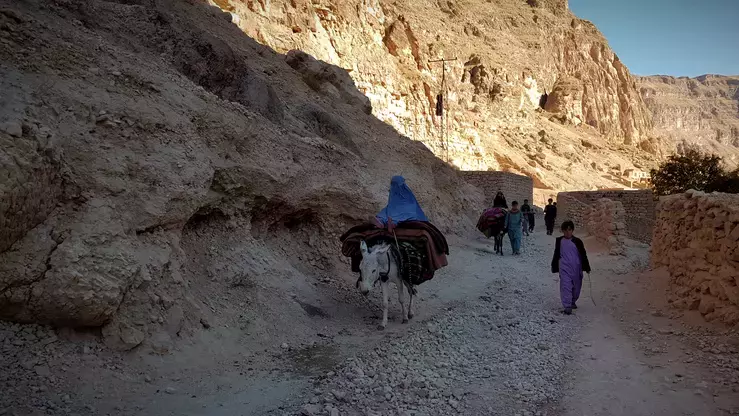Despite the international community providing millions of aid to Afghanistan over the past two decades, the country’s healthcare system remains paralyzed. Currently, a significant number of citizens in both major cities and remote villages lack access to basic healthcare services. Corruption, local interference, armed conflicts, insecurity, and lack of oversight have contributed to depriving citizens of healthcare services. Despite warnings from international organizations about increasing diseases, child malnutrition, rising maternal mortality, and polio cases, rural residents of the country continue to be neglected. Local sources report that approximately 15,000 families in 130 villages of Jawand District in Badghis Province have no access to healthcare services. These villagers must endure a four-and-a-half-hour journey by vehicle to reach Jawand District Hospital.
Residents in the remote area of Jillay, located within Jawand District, have reported that children and women in this region lack access to experienced doctors, quality healthcare services, and medication. According to their accounts, children in the villages of Jawand District have been deprived of polio vaccines from September 2022 to March 2023. During this period, two pregnant women died during childbirth, and four children succumbed to illness. Additionally, a young boy lost his life due to bleeding following a traffic accident.
In an interview with the Hasht-e Subh Daily, Ahmad Shah, a resident of the “Zawa” area within Jawand District, expressed the extreme helplessness and deprivation they face. He highlighted the dire consequences resulting from the lack of doctors and clinics, leading to the loss of lives among women, children, and youth in their community. According to Ahmad Shah, their area is among the most deprived. He further mentioned that there is only one clinic in the center of Jawand district, which takes five hours to reach. Tragically, many patients perish on the way. Ahmad Shah recounted an incident from the previous winter when heavy snowfall made the roads impassable. A pregnant woman from their village went into labor but couldn’t reach the hospital due to the snowy conditions, resulting in her unfortunate demise.
Providing additional details, a resident from Jawand District reveals, “Two women, one from our village, Zawa, and another from Kaazak Khurd village, died during childbirth. Additionally, one child from Saya Roye village, one child from Nawpai village, and two other children from the Kaazak Kalan area also lost their lives within the span of two to three winter months. The absence of doctors and medication was the cause behind these tragic incidents.”
Sources report that around 15,000 families residing in 130 villages of Jawand District lack access to healthcare services. They further indicate that even mobile health teams do not extend their services to these areas. The residents of these villages face the daunting task of traveling either ten hours on foot or four and a half hours by vehicle to reach the sole hospital located in the center of Jawand District. Compounded by road damage, the limited number of vehicles, including Minibus vehicles, can reach these villages.
Fazluddin, a prominent figure in the remote region of Jillay, reveals, “Our area is neglected due to its remoteness. Our children have been deprived of polio vaccinations throughout the winter months. Only in the month of Hamal [March/April], mobile teams arrived and vaccinated some children. However, many children in our area remain unvaccinated against measles because there is no nearby health center for us to take them to.” He highlights that a mobile health team called the “Afghan Youth Services Organization” visited and vaccinated children in only eight villages of Jawand district during Hamal [March/April]. According to him, road damage prevented this mobile health team from reaching other villages in the district.
Abdul Ghafoor, a local resident, experienced the loss of a relative due to the absence of health services. He recounts, “On Wednesday, May 10, two young men on motorcycles had an accident near our area. One of them suffered severe bleeding, but there was no nearby doctor or clinic. Despite repeatedly calling the Jawand hospital and offering to cover the fuel and rental expenses, they did not send an ambulance. After four hours of uncontrolled bleeding, this young man tragically passed away.” He laments, “If there had been a doctor available, they could have provided medication, stopped the bleeding, and saved our patient’s life. Sadly, we witnessed the death of a young child right before our eyes.”
Meanwhile, a source at the Public Health Department of Badghis province confirms the failure to administer polio vaccinations to children in Jawand district and other districts of Badghis province. However, no specific reasons for this non-compliance are provided. Children in Badghis province, particularly in the villages of Jawand district, have been denied access to polio vaccinations. The latest statement from the United Nations International Children’s Emergency Fund (UNICEF) highlights the lack of necessary vaccinations for thousands of children in Afghanistan. Administrative data from last year reveals that approximately 117,000 children throughout Afghanistan did not receive polio vaccinations. Moreover, Afghanistan has experienced a surge in viral diseases such as polio, measles, COVID-19, and other infectious diseases over the past three years.












